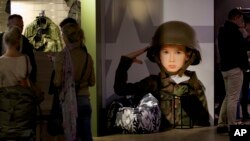Back in 2004, Russia began putting extra revenue from oil sales into what was initially called the Stabilization Fund – a rainy day fund designed to serve as a budgetary reserve if energy prices dropped precipitously. Four years later, the Stabilization Fund was split in two.
One part is the Reserve Fund, which is invested in low-yield foreign securities and whose mission is to ensure federal budget financing in case oil and gas budget revenues declined. The other part is the National Wealth Fund, whose mission is to support Russia’s pension system. Both are funded by oil and natural gas sales.
In January 2008, with world oil prices surging, the Reserve Fund hit a peak of $142.6 billion. Today, with oil prices having crashed and Russia the target of Western economic sanctions due to its actions in Ukraine, the picture is starkly different. The country will run out of resources for replenishing the Reserve Fund next year, said Russian Finance Minister Anton Siluanov earlier this week.
“We will deplete our reserves by about 2.6 trillion rubles ($40.85 billion),” more than half of the total, Russian media quoted Siluanov as saying. “This means 2016 will be the last year we will be able to spend our reserves this way. After that, we won’t have such resources.”
Siluanov told members of the Federation Council, the upper house of Russia parliament, that if oil prices remain at the current level of just below $50 a barrel and the dollar-ruble exchange rate remains unchanged, Russia’s federal budget could experience a shortfall of 900 billion rubles ($14.14 billion) in 2016.
Russia’s financial ombudsman, Pavel Medvedev, agrees with Siluanov’s assessment, telling VOA the situation is “not good.” He added that “Siluanov, being a conscientious person and perhaps not totally an official in the bad sense of the word, allowed himself to say what he thinks.”
Calls for cuts in spending
Medvedev, who previously served as chairman of the banking subcommittee in the State Duma, the lower house of Russia’s parliament, said he fears the country's economy will not be able to develop normally under these conditions.
"The situation will only worsen if the regular flows of cash into the budget are not increased or if (government) expenditures are not greatly reduced,” he said. “And in my view, they can be cut quite significantly."
Medvedev noted that military spending increased substantially last year – by almost a third. It has increased again this year, he said, although not so dramatically. However, cutting defense spending will be difficult to implement for “political reasons,” he said.
"Today in Russia there is an enduring opinion that military spending is something of boon, a stimulus for the domestic economy,” he said. “Many academic papers claim that money thrown at the production of tanks and missiles indirectly encourages the development of the economy. But that is not true. When you go to the store, you don't say: ‘Cut me a slice of a barrel of the tank.’ Everyone wants butter, bread, sausages and so on.”
The situation was similar under Soviet rule, "which largely perished under the weight of military expenditures,” Medvedev said.
“There is a real danger that the patience of many segments of the population could run out due to a serious reduction in incomes," he said, noting that the country’s pensioners are already feeling the pinch.
Prospects gloomy
Sergei Zhavoronkov, a senior researcher at the Gaidar Institute for Economic Policy in Moscow, also believes the Reserve Fund is on its last legs, telling VOA that based on its current rate of spending, the fund will run out of money by 2017. He has an equally gloomy view of Russia’s economic prospects more generally.
"The country's economy cannot develop normally in the absence of access to cheap foreign credit resources” and given the current levels of spending on the military and security, Zhavoronkov said. “In the end, this will have an impact primarily on vulnerable segments of the population.”
He noted that Russian pensions were indexed by only 4 percent this year, yet the annual inflation rate is officially projected to hit 6.5 percent. But it will probably end up reaching above 10 percent.
Thus, Russia is likely to run out of the money needed to plug budgetary holes and cushion the impact of falling oil prices and economic sanctions on vulnerable sectors of the population.
What political impact this could have, if any, remains unclear, given the Kremlin’s increasingly authoritarian rule. Russia holds legislative elections next year, and presidential elections in 2018.





